|
|
|
Sort Order |
|
|
|
Items / Page
|
|
|
|
|
|
|
| Srl | Item |
| 1 |
ID:
148916
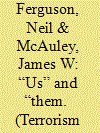

|
|
|
|
|
| Summary/Abstract |
This article draws on data from one-to-one interviews with members and former members of the Ulster Volunteer Force, Ulster Defence Association, Red Hand Commando, Ulster Political Research Group, and the Progressive Unionist Party to explore the dynamic and fluid perceptions of the Irish Republican Army (IRA) and Sinn Féin among Ulster loyalists. The article will explore how attitudes and perceptions are influenced by the shifting political landscape in Northern Ireland as Ulster loyalists come to terms with the new realities created by the peace process, security normalization, decommissioning, and the rise in the threat of dissident republican violence. The article will also demonstrate that these perceptions are not purely antagonistic and based on the creation of negative, stereotypical “enemy images” fuelled by decades of conflict, but pragmatic, bound to societal and local events, and influenced by intragroup attitudes and divisions, in addition to the expected conflictual ingroup vs. outgroup relationships. Finally, the article will explore how loyalists employ republicanism and the transformation of the Provisional IRA in particular, as a mirror or benchmark to reflect on their own progress since 1994.
|
|
|
|
|
|
|
|
|
|
|
|
|
|
|
|
| 2 |
ID:
117610
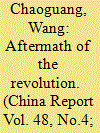

|
|
|
|
|
| Publication |
2012.
|
| Summary/Abstract |
The Revolution of 1911 in China not only put an end to the feudal monarchy that had lasted several centuries but also opened a new chapter, the era of republicanism in China. The founding of the Republic of China led to the proliferation of political parties, the thriving of legislative organs and the emergence of a cabinet system. However, historical evolution does not always conform to people's expectations. Revolutionary ideals could not be fully realised in a country which had been dominated by authoritarianism for thousands of years. As a result, Western-style democracy failed to take root in Republican China. Instead of embarking on a journey towards democracy, prosperity and independence, China gradually descended into a state where warlords took control and plunged the whole country into conflict.
|
|
|
|
|
|
|
|
|
|
|
|
|
|
|
|
| 3 |
ID:
080578
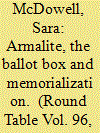

|
|
|
|
|
| Publication |
2007.
|
| Summary/Abstract |
Commemoration of the Northern Ireland Troubles has gained increasing currency since the inception of the first paramilitary ceasefires in 1994. Imagined initially as a mechanism through which to express grief and acknowledge loss, remembering the past has an increasingly social and political value. Inscribing narratives of the past into the streetscape is inexorably linked to the present as some of the main actors of the conflict vie for power and territory. A political resource, memorializtion has been employed as a tool to alter the parameters of the Troubles. This paper focuses on the changing fortunes of Sinn Féin (the political wing of the paramilitary organiztion the Irish Republican Army), and the British government in peacetime Northern Ireland, through an examination of the commemoration of their respective dead
|
|
|
|
|
|
|
|
|
|
|
|
|
|
|
|
| 4 |
ID:
109595
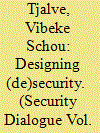

|
|
|
|
|
| Publication |
2011.
|
| Summary/Abstract |
This article pursues three interrelated objectives. Above all, it seeks to theorize desecuritization at the level of polity rather than policy; to distinguish between forms of political order and the likelihood that they will give in to the call for exceptional measures. Second, and to achieve that goal, it suggests a turn away from continental notions of 'the people' and towards American debates over 'the public sphere': a realm deliberately designed and continually cultivated to exercise autonomous, pluralistic and politicized contestation. Third, it examines why the 'speechlessness' of contemporary Western security practices may inhibit that public sphere from functioning properly.
|
|
|
|
|
|
|
|
|
|
|
|
|
|
|
|
| 5 |
ID:
113274
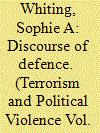

|
|
|
|
|
| Publication |
2012.
|
| Summary/Abstract |
In modern day Irish republicanism, "dissident" is a vague and imprecise term. It is utilised by the media and mainstream politicians to collectively label a broad range of groups and individuals who reject that participation in constitutional politics, in its current form, will achieve their ultimate goal of a United Ireland. This article investigates the discourse from the mainstream media and politicians surrounding dissident groups in order to explore the construction of the "dissident" profile. The piece then considers the composing and transporting of the political messages from two republican groups, Republican Sinn Fein (RSF), and the 32 County Sovereignty Movement (32CSM). This article undertakes a content analysis of the two group's newspapers (Saoirse and Sovereign Nation) over a time period of seven years and will question how "dissidents" attempt to defend and justify their position in relation to this mainstream media narrative, assessing how dissidents attempt a counter-narrative. The aim of such analysis is to discover more about how "dissidents" attempt to portray themselves and justify their position on the republican spectrum.
|
|
|
|
|
|
|
|
|
|
|
|
|
|
|
|
| 6 |
ID:
176085


|
|
|
|
|
| Summary/Abstract |
How is it possible to account for the continuing presence of monarchy in advanced social democracies? Much traditional political science assumes teleologically that monarchies inevitably transform into republics as a higher form of governance. This comparative study of the eight main European monarchies maintains otherwise: monarchy is perfectly compatible with democracy, and can help strengthen citizens’ loyalty to the system of government. Provided it delivers a politically impartial head of state, monarchy can endure indefinitely with government and popular support. In practice, the countries studied are de facto republics, but with hereditary heads of state who occupy social roles beyond the reach of quotidian politics. Monarchy’s principal danger is not republicanism, but the pressures of conflicting expectations about what is required of royal families, and the relentless intrusions of modern media in an age when royalty and celebrity are in danger of being conflated. Responses to Covid‐19 show how monarchs can speak to and for their nations in ways no partisan politician can.
|
|
|
|
|
|
|
|
|
|
|
|
|
|
|
|
| 7 |
ID:
181046


|
|
|
|
|
| Summary/Abstract |
The accepted knowledge concerning dissident splits from the Provisional IRA is that different groups or individuals broke away because of their disagreement with the political progresses made during the peace process. This paper will argue that other factors were at play. Primarily, that ‘deviant’ cohesion played a significant role. While the question of politicialisation offers significant insight into the political dimension of this split, this article will adopt a more sociological approach. Answers provided through this sociological perspective are not intended to undermine the political explanation, rather to build upon them and provide a more holistic understanding of the issue.
|
|
|
|
|
|
|
|
|
|
|
|
|
|
|
|
| 8 |
ID:
099886
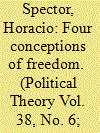

|
|
|
|
|
| Publication |
2010.
|
| Summary/Abstract |
Contemporary political philosophers discuss the idea of freedom in terms of two distinctions: Berlin's famous distinction between negative and positive liberty, and Skinner and Pettit's divide between liberal and republican liberty. In this essay I proceed to recast the debate by showing that there are two strands in liberalism, Hobbesian and Lockean, and that the latter inherited its conception of civil liberty from republican thought. I also argue that the contemporary debate on freedom lacks a perspicuous account of the various conceptions of freedom, mainly because it leaves aside the classic contrast between natural liberty and civil liberty. Once we consider both the negative/positive distinction and the natural/civil one, we can classify all conceptions of freedom within four basic irreducible categories. In light of the resulting framework I show that there are two distinct conceptions of republican liberty, natural and civil, and that the former is coupled with an ideal of individual self-control.
|
|
|
|
|
|
|
|
|
|
|
|
|
|
|
|
| 9 |
ID:
101509
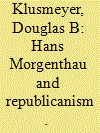

|
|
|
|
|
| Publication |
2010.
|
| Summary/Abstract |
Recent scholarship has called attention to the republican dimension of Hans Morgenthau's approach to politics in the postwar era, but the role republicanism played in his thought remains ambiguous. This essay examines that role, and explores its tensions with other aspects of his understanding of politics. It argues that he expanded and deepened his approach to politics as he developed a republican critique of American domestic politics. However, his conception of international politics remained rooted in the reason-of-state tradition, and evinces little evidence of his increasing engagement with republicanism. In this selective use of republicanism, he left its tensions with other aspects of his thinking unresolved, but this usage also suggests his recognition of the inadequacy of the original formulation of his realist approach. In considering what IR theorists today may learn from republicanism, his example is highly instructive in any effort to reconstruct the foundations of realism.
|
|
|
|
|
|
|
|
|
|
|
|
|
|
|
|
| 10 |
ID:
116793
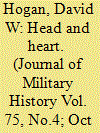

|
|
|
|
|
| Publication |
2011.
|
| Summary/Abstract |
In recent years, Afghanistan and Iraq have drawn new attention to an old subject: American attitudes toward warfare. This essay surveys the existing literature to approach this problem through the interlocking factors of reason and feeling. At first, Americans reconciled these factors, and justified their wars, because republicanism, romantic nationalism, and Victorian culture created the comforting sense of a chosen nation in an orderly, moral cosmos. When two world wars and the Great Depression produced modernist doubt, Americans used nationalism, pragmatism, and faith in technology to guide and sustain them. By the late twentieth century, however, modernist challenges to old universals in a larger and more pluralistic society became harder to reconcile as debates over wars polarized along emotional extremes, while reason's proponents clung to a precarious middle ground. Currently, the prospect of a revived consensus appears remote.
|
|
|
|
|
|
|
|
|
|
|
|
|
|
|
|
| 11 |
ID:
119637
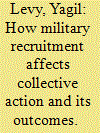

|
|
|
|
|
| Publication |
2013.
|
| Summary/Abstract |
This paper aims to advance the research on the conjunction of two fields-antiwar protest and casualty aversion-by offering a conceptual development of the role of military recruitment in affecting casualty sensitivity-incited antiwar mobilization. Scholars have shown that sensitivity to losses is not a constant variable. Its reflection in the public sphere is affected by variables clustered together as "the politics of war," such as sense of threat, mission success, number of casualties, and elite consensus, which can be mediated by collective actors. However, the role of the mode of military recruitment in influencing collective action in the military realm has been neglected. It is argued that the mode of military recruitment mediates collective actors' ability to leverage the politics of war to challenge dominant discourse and influence war policy, owing to the cumulative impact of four recruitment-related variables: republicanism, social power, the favoring of "voice," and bounded discourse. All shape the movement's framing and resources in a way that affects mobilization.
|
|
|
|
|
|
|
|
|
|
|
|
|
|
|
|
| 12 |
ID:
155792
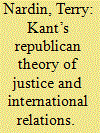

|
|
|
|
|
| Summary/Abstract |
Kant’s primary concern in writing on international relations is how to achieve ‘justice’ (Recht) between states. This means that instead of reading Kant as a theorist of peace or world government, as IR theorists have usually done, he is better read as a theorist international justice. His view of justice, which identifies it with a legal order that respects freedom as independence or nondomination, is broadly republican. But he equivocates on the possibility of justice at the international level, and this narrows what is usually seen as a wide gap between Kant’s thought and political realism. The paradox his uncertainty reveals is that it is wrong for states to remain in a lawless condition yet impossible for them to escape it so long as they remain independent. An international order cannot generate genuine law because there are no institutions to make, interpret, or enforce it. This means that states are entitled to determine their own foreign affairs. The gap between sovereignty and justice cannot be closed so long as these ideas are defined as they are within the state. The problem is not that a full, secure, and nonvoluntary system of justice that preserves the sovereignty of states is contingently unlikely. It is conceptually impossible. This conclusion poses a challenge to current theories of global justice.
|
|
|
|
|
|
|
|
|
|
|
|
|
|
|
|
| 13 |
ID:
092035
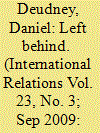

|
|
|
|
|
| Publication |
2009.
|
| Summary/Abstract |
Anarchy and the balance of power are the two core ideas in Waltz's neorealism, and he explicitly draws them from early modern political theory, particularly Hobbes and Rousseau. Unfortunately, Waltz leaves behind a key variable in these early modern state-of-nature arguments: violence interdependence - the capacity of actors to harm one another (independent of distribution of power). This difference between the extreme insecurity of the state of nature and the tractable insecurity of the state of war derives from different degrees of violence interdependence. The variable is implicit but powerful in Hobbes, and explicit in Rousseau's analysis of topographic fragmentation as a foundation for the European state system. As the effects of the industrial revolution made themselves felt, many theorists (the global geopoliticans, Carr and many liberals) continued to employ the variable Waltz dropped, and they generally argued that Europe had shifted from a state-of-war to a state-of-nature anarchy, thus posing the choice of catastrophe or integration. Herz and Morgenthau continue this argument in the nuclear era, reaching very different conclusions than Waltz. Similarly, the balance of power was conceived by early modern republican theorists as the counter to hierarchy, and this was transposed to the 'system level' via the device of referring to Europe as a whole as a 'republic' that was in part 'by nature'. Other important republican power restraints (notably division, mixture and union) were dropped by Waltz but are developed by liberal globalist security theory.
|
|
|
|
|
|
|
|
|
|
|
|
|
|
|
|
| 14 |
ID:
077883


|
|
|
|
|
| Publication |
2007.
|
| Summary/Abstract |
Claims by liberal states to be furthering democratic values and material prosperity are being contested due to the manner in which liberal states are attempting to provide for their own security, to the way in which democracy is being more forcefully projected onto the international order, and to the dislocations and inequality associated with global capitalism. The appeal of liberalism as a form of political and economic organization has declined even as its tenets have come to be taken for granted by virtue of their grounding in scientific reasoning. A sustainable resolution to the crisis of legitimacy of the liberal state requires the internal regeneration of the liberal state itself, a renewed commitment to dialogue in multilateral institutions, and a persuasive revitalization of the claims liberal states make that render their example attractive to others
|
|
|
|
|
|
|
|
|
|
|
|
|
|
|
|
| 15 |
ID:
090134


|
|
|
|
|
| Publication |
2009.
|
| Summary/Abstract |
For Kant and many modern cosmopolitans, establishing the rule of law provides the chief mechanism for achieving a just global order. Yet, as Hart and Rawls have argued, the rule of law, as it is commonly understood, is quite consistent with "great iniquities." This criticism does not apply to a sufficiently robust, republican conception of the rule of law, which attributes a basic legal status to all persons. Accordingly, the pervasiveness of dominated persons without legal status is a a fundamental violation of the rule of law. This legal status can be understood in Kant's sense as an original "right to freedom," one that is not derived from or acquired by membership in a community or from citizenship. The realization of this kind of legal status can already be found in the "cosmopolitan constitutions" of many democracies, which include rights of persons (and not just citizens) to habeas corpus and other statuses that protect those vulnerable to domination. In order that all persons have the appropriate institutional space within which to exercise the powers of persons to address and make claims, institutions such as human rights courts to which those who lack legal status can appeal and be recognized are necessary for a form of the rule of law that is adequate to current circumstances.
|
|
|
|
|
|
|
|
|
|
|
|
|
|
|
|
| 16 |
ID:
148915
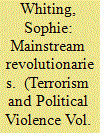

|
|
|
|
|
| Summary/Abstract |
Despite the seismic shift of Sinn Féin from being the “mouthpiece” of the Provisional Irish Republican Army to the largest nationalist force in Northern Ireland, the party continues to project its objectives within the revolutionary politics and tradition of 1916. Whilst various groups across the island of Ireland stress their loyalty to Irish independence and allegiance to their republican forefathers, 2016 also plays host to devolved assembly elections in Northern Ireland. The centenary of the Easter Rising is therefore a poignant moment to reassess republican politics, more specifically, the relationship between the armed revolutionary tradition and constitutionalism. Within the post-peace process era Sinn Féin have been accused of maintaining an autocratic culture and an intra-party framework that is more representative of a clandestine revolutionary organisation than a political party. Yet, simultaneously, Sinn Féin have not been immune to the pressures experienced by other modern political parties, bound by the laws of electoral competition and driven by office-seeking priorities. In order to explore Sinn Féin within the modern political arena, this article firstly examines the broader debate surrounding how armed groups make the transition into constitutional politics. Secondly, public opinion survey data is used to judge the basis of Sinn Féin's electoral appeal. Finally, internal party documents are used to examine party structure, intra-party democracy, and professionalisation in order to judge the extent to which Sinn Féin have completed the transition from being a “mouthpiece” to their armed counterpart, towards being a “normal” political party.
|
|
|
|
|
|
|
|
|
|
|
|
|
|
|
|
| 17 |
ID:
169981
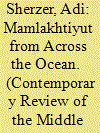

|
|
|
|
|
| Summary/Abstract |
The concept of Mamlakhtiyut, defined by Bareli and Kedar as the Israeli version of republicanism, has shaped Israeli political system and civil culture from the 1950s onward. This article examines how this inter-Israeli concept affected David Ben-Gurion’s inter-Jewish policy toward the Jews of the Diaspora during the constructive era of the first year of statehood. The discussion focuses on the journey of Ben-Gurion to the USA during the spring of 1951 and the launching of the Bonds campaign as an alternative Israeli fundraising tool. The study of the journey’s context and a deep analysis of Ben-Gurion’s speeches during the journey demonstrate the importance of the Mamlakhti approach in the setting of Israel–Diaspora relations. I argue that the Mamlakhti-republican discourse was needed by both sides to deepen the relationship during the 1950s, point its deep influence on both policy and discourse, and suggest that today too it may foster the discourse and reframe some of the fundamental subjects that divide Israel from the Diaspora.
|
|
|
|
|
|
|
|
|
|
|
|
|
|
|
|
| 18 |
ID:
117510


|
|
|
|
|
| Publication |
2012.
|
| Summary/Abstract |
Jamaica is one of the few Commonwealth countries that still recognises the Privy Council in London as its court of final appeal. This article argues that the monarchy in Jamaica should be replaced by a republican form of government and that the Privy Council should be replaced as the final appellate tribunal by the Caribbean Court of Justice. In the view of the author, this is an issue that goes to the heart of the identity and self-image of the Jamaican people, and it is rooted in the cry for freedom of Jamaicans' enslaved ancestors.
|
|
|
|
|
|
|
|
|
|
|
|
|
|
|
|
| 19 |
ID:
126289
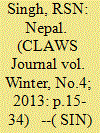

|
|
|
| 20 |
ID:
112349
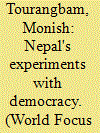

|
|
|
|
|
|
|
|